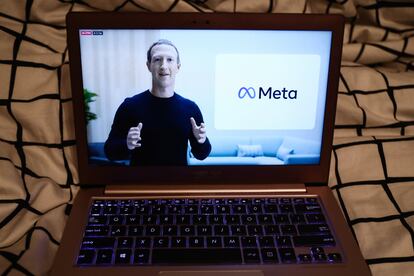Quest Pro mixed reality glasses: Meta’s bid to bring the metaverse to the masses
Mark Zuckerberg has announced alliances with Microsoft and entertainment industry giants as he looks to attract younger generations to Meta

The metaverse will cease to be something totally abstract as of October 25 when the Meta Quest Pro goes on sale. The new virtual and mixed reality glasses are Meta’s most technologically advanced attempt to popularize the metaverse, a digital environment to which the company, founded by Mark Zuckerberg, has entrusted its future. The biggest novelty of the new glasses is that they work in mixed reality: that is to say, they are capable of integrating three-dimensional virtual objects (that which is seen in virtual reality) into the physical environment surrounding the user. This could be, for example, the avatar of a co-worker sitting across the desk. Or a massively large screen to work on, which could render physical work screens obsolete. It will cost €1,799.99 ($1,746), a considerable hike over the company’s previous model, the Quest 2, which retails at about €400 ($388).
Zuckerberg showed off the Quest Pro’s capabilities at Meta Connect, the company’s annual event, while also making another important workplace announcement: Meta has partnered with Microsoft. Satya Nadella, Microsoft’s CEO, explained that the company’s work tools, such as Teams, can be used with the Quest Pro glasses, so the avatars of those who are connected remotely can appear next to the user while they type on their computer. The system will also allow people to share a virtual desk on which papers, documents or models are displayed and that is visible to all participants in the meeting. “We want to create the sense that everyone is present when you’re working with them, even if they’re not really there,” Zuckerberg said.
The Quest Pro has a more advanced and compact design than the Quest 2. It also features new technologies, such as an eye-tracking system and another capable of extracting facial expressions so that a user’s avatar represents a more natural and reliable reproduction of the host. These sensors will be incorporated on top of those that Meta’s previous glasses already contain, in addition to all kinds of cameras, microphones and speakers to recreate a fictitious world in the eyes of the wearer. The goggles are also used in conjunction with Meta Quest Touch Pro controllers, a kind of game console controller that allows a user to touch objects in the metaverse.
At last year’s Meta Connect conference, Zuckerberg doubled down on his commitment to the metaverse by officially announced that his flagship company, Facebook, would be renamed Meta. What Zuckerberg and his team demonstrated was a mix of test products and recreations of how they hope the metaverse will evolve. The idea is to develop an immersive virtual environment that can be accessed with virtual or mixed reality glasses. In this new world, which Zuckerberg sees as “the logical evolution of the internet,” we will interact with our friends, play video games, work, shop, watch television shows or learn. “Eventually, I’m confident that we will be seen as a metaverse company,” Zuckerberg said.
Microsoft is not the only company that has agreed to a deal to join the metaverse. The consulting firm Accenture will work with Meta and Microsoft to design customized virtual workspaces for companies. Meanwhile, Zuckerberg also announced several partnerships in the entertainment industry, including with Universal and Dreamworks, to offer “new audiovisual experiences.”

Facebook losing users for first time
Meta is not enjoying its finest moment. In February of this year, Facebook, the jewel in the company’s crown, announced that for the first time since it was launched it is losing users instead of gaining them. Until then, it had been able to compensate for a lack of interest in the platform among young people via huge growth in other countries. Still, Facebook remains the largest social network in the world, with nearly two billion daily active users.
In July, Meta posted its first annual revenue drop of 1% over the second quarter a year earlier to $28.8 billion. A few weeks ago, Zuckerberg warned that he was going to freeze hiring, something that has not happened since Facebook was launched in 2004. He also said that various parts of the company would have to be restructured and that in 2023 Meta would probably employ fewer people than it does now, as reported by Bloomberg.
Zuckerberg’s company hopes that the metaverse will provide a gateway to Meta for younger users: some popular video games such as Fortnite or Roblox already contain some of the fundamental dynamics of the environment. Meta is also banking on the fact that navigating virtual reality is easier and more intuitive for the generations that have grown up in the digital age than for those who did not.
Tu suscripción se está usando en otro dispositivo
¿Quieres añadir otro usuario a tu suscripción?
Si continúas leyendo en este dispositivo, no se podrá leer en el otro.
FlechaTu suscripción se está usando en otro dispositivo y solo puedes acceder a EL PAÍS desde un dispositivo a la vez.
Si quieres compartir tu cuenta, cambia tu suscripción a la modalidad Premium, así podrás añadir otro usuario. Cada uno accederá con su propia cuenta de email, lo que os permitirá personalizar vuestra experiencia en EL PAÍS.
¿Tienes una suscripción de empresa? Accede aquí para contratar más cuentas.
En el caso de no saber quién está usando tu cuenta, te recomendamos cambiar tu contraseña aquí.
Si decides continuar compartiendo tu cuenta, este mensaje se mostrará en tu dispositivo y en el de la otra persona que está usando tu cuenta de forma indefinida, afectando a tu experiencia de lectura. Puedes consultar aquí los términos y condiciones de la suscripción digital.









































